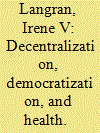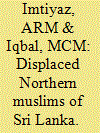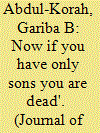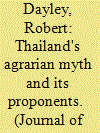|
|
|
Sort Order |
|
|
|
Items / Page
|
|
|
|
|
|
|
| Srl | Item |
| 1 |
ID:
108504


|
|
|
|
|
| Publication |
2011.
|
| Summary/Abstract |
Since its liberation from colonial rule, India, a largely populated country, has always banked on mega projects to accelerate its economic development. However, such mega-development projects are found to generate very limited socioeconomic benefits for the very people for whom they were initially designed and planned. On the other hand, many such projects are benefiting the rich 'omnivores' and adversely affecting the livelihood of the land-dependent 'ecosystem people'. This article deals with just such a story of ephemeral development, that of Independent India's first mega project, the Hirakud Dam on the Mahanadi River. By making its main focus the issues of irrigation-water management and the plight of the tail-end farmers in recent years, this article highlights how the key objectives of India's multipurpose river dam project, Hirakud, have failed during the last 50 years of its operation in terms of flood control, irrigation coverage and electricity generation.
|
|
|
|
|
|
|
|
|
|
|
|
|
|
|
|
| 2 |
ID:
108495


|
|
|
|
|
| Publication |
2011.
|
| Summary/Abstract |
In 1991, the Philippines joined a growing list of countries that reformed health planning through decentralization. Reformers viewed decentralization as a tool that would solve multiple problems, leading to more meaningful democracy and more effective health planning. Today, nearly two decades after the passage of decentralization legislation, questions about the effectiveness of the reforms persist. Inadequate financing, inequity, and a lack of meaningful participation remain challenges, in many ways mirroring broader weaknesses of Philippine democracy. These concerns pose questions regarding the nature of contemporary decentralization, democratization, and health planning and whether these three strategies are indeed mutually enforcing.
|
|
|
|
|
|
|
|
|
|
|
|
|
|
|
|
| 3 |
ID:
108498


|
|
|
|
|
| Publication |
2011.
|
| Summary/Abstract |
It has been widely established as fact that ethno-political conflict and civil war between the Tamils and the Sinhalese in Sri Lanka have generated immense sufferings among the Tamil and Sinhalese ethnic groups at the level of the masses. However, very little has been discussed about the plights of the Muslims of the North and East, particularly the former who became victims of the Sri Lanka's long running ethnic conflict. In October 1990, the entire Muslim population of Jaffna, Vavumiya, Mullaitivu, Mannar and Kilinochchi districts in the northern region were evicted from their homes at gun point and turned into Internally Displaced Persons overnight by the Tamil Tigers (Liberation Tigers of Tamil Eelam). Muslims of the North claim that they have some basic and important problems to be solved. This study attempts to identify some of the special problems of the expelled Northern Muslims who are languishing in the state supported refugee camps in Puttalam district. A questionnaire on the special problems of the Northern Muslims was circulated to the North Eastern youth, students, unemployed Muslims, and farmers. The population of the target group was selected randomly. More than 250 questionnaires were issued. Ninety percent of them responded to the questionnaire. Interviews were also conducted over the phone with an educated section of the Northern Muslims. Finally, solutions are suggested to the protracted ethno-political conflict based on power-sharing and easing the special problems of the Northern Muslims.
|
|
|
|
|
|
|
|
|
|
|
|
|
|
|
|
| 4 |
ID:
108501


|
|
|
| 5 |
ID:
108491


|
|
|
|
|
| Publication |
2011.
|
| Summary/Abstract |
Research capacities in African universities are less developed due to many challenges - poor research infrastructure, limited Information and Communication Technologies (ICTs), the lack of leadership mandate and support, the lack of congenial political and academic environment in some countries, shortage and lack of faculty to pursue academic research due to heavy teaching loads, inadequate financial support, etc. This paper discusses the challenges facing higher education research in Africa. Using research reports, policy papers, and data in the Science Citation Index Expanded (SCI-EXPANDED), the Arts & Humanities Citation Index (A&HCI) and the Social Sciences Citation Index (SSCI) from Thompson's Web of Science, this paper discusses the state of academic research in Africa. The author argues that for the continent of Africa to experience socioeconomic development, universities and research institutes need robust research agendas that will unleash to their economies the knowledge, ideas, innovation, and technologies for economic growth.
|
|
|
|
|
|
|
|
|
|
|
|
|
|
|
|
| 6 |
ID:
108493


|
|
|
|
|
| Publication |
2011.
|
| Summary/Abstract |
Thailand's agrarian myth holds that culturally-based, small-scale subsistence farming is the most desirable form of community life for rural Thais. This article outlines Thailand's agrarian myth and argues that its current promotion finds support in an obsolete 'sufficiency ethic', rather than from the country's pragmatically-oriented farmers. Proponents of this myth come from Thailand's cultural and bureaucratic elite, urban intellectuals, and religious fundamentalists. Based on field research and secondary sources the article demonstrates how the attitudes and behaviors of contemporary Thai farmers belie the agrarian myth which non-farming elites now advocate. The article concludes that yellow-shirted proponents of Sufficiency Economy, Community Culture, and austere Buddhist fundamentalism should adjust their vision to the reality that Thailand's forward-looking farmers desire a rural lifestyle beyond the agrarian myth.
|
|
|
|
|
|
|
|
|
|
|
|
|
|
|
|
| 7 |
ID:
108503


|
|
|
|
|
| Publication |
2011.
|
| Summary/Abstract |
This article analyses and reviews the progress made by Kazakhstan, a post-communist country in Central Asia, towards its journey to become a knowledge-based society. An attempt has been made to examine how and to what extent good governance plays a critical role in building a knowledge-based society. Available evidence suggests that Kazakhstan made considerable advancement, in the midst of profound transitional challenges, to move to transform itself into a knowledge society. The article argues that, while improving governmental quality, good governance will have a solid impact on transforming Kazakhstan to a knowledge-based society in order to achieve the 'Kazakhstan 2030' policy strategy.
|
|
|
|
|
|
|
|
|
|
|
|
|
|
|
|
|
|
|
|
|